The seven most inspiring LGBTQ+ images that defined 2023
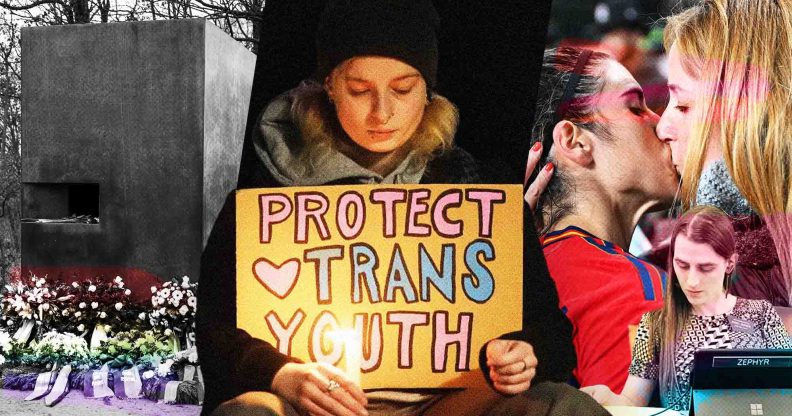
These are the seven most powerful LGBTQ+ pictures of 2023 (Getty/ZooeyZephyr)
This year has brought huge triumphs for the LGBTQ+ community, with historic strides towards equality, but at the same time the past 12 months has been the scene for heart-breaking tragedies and political blows.
First of all, there was much to celebrate. Several parts of the world, including Mauritius and the Cook Islands, officially decriminalised homosexuality, while, in May, Sri Lanka‘s supreme court also gave the green light to decriminalisation – a resounding victory following decades of anti-gay hostility. Equal marriage also became available to millions of people after Andorra legalised same-sex unions, while Estonia‘s marriage equality legislation was passed and is slated to take effect from the start of the new year.
For trans people, self-ID was introduced in Spain, Germany and Finland, while trans-inclusive bans on so-called conversion therapy came into force in Cyprus and Iceland.
However, LGBTQ+ people around the world faced soaring hate crime rates, political scapegoating and increasingly harsh laws, such as those forced to live under Uganda’s Anti-Homosexuality Bill.
India’s top court decided against recognising same-sex marriage, the UK – again – failed to outlaw conversion practices and Pride Month was overshadowed by boycotts of many major brands because they dared to include LGBTQ+ people in their advertising.
Many Pride celebrations were also prohibited as governments sought to crack down and silence the community. Despite this, people remained fierce and marched, facing arrest and violence from police and conservative groups.
There has also been intense transphobia, with transgender people banned by major sporting bodies from competing in the sports they love.
The trans community was the focus of mainstream media scrutiny, and faced horrific online abuse with little support from social media companies.
In America, specifically, the seemingly never-ending raft of anti-LGBTQ+ legislation continues to ripple across the nation and focuses heavily on trans folks and drag queens, with legislation aimed at revoking access to gender-affirming care, banning performances near children and rolling back anti-discrimination protections.
Throughout the year, photo-journalists and documentary photographers were on the front lines and captured many of these key moments on camera.
These are the most powerful photographs of 2023 – depicting LGBTQ+ life, love and protest.
Spain’s Alba Redondo kisses girlfriend pitch-side

During the FIFA women’s World Cup in the summer, Spanish forward Alba Redondo shared an adorable celebratory kiss with her girlfriend Cristina Monleón on the side of the pitch, after the team thrashed Zambia 5-0.
One of La Roja’s openly LGBTQ+ stars, Redondo was not shy about the public display of affection and a quick scan of the pair’s Instagram accounts shows they are very happy to share their loved-up status with the world.
The image represented far more than two people in love, though.
Prior to the World Cup, FIFA banned the rainbow-coloured One Love armband and “political statements” being made at the event, instead issuing its own campaign armbands which distinctly lacked any mention of the LGBTQ+ community. In response, players in the tournament – an unprecedented number of whom were queer – found ways to sneakily skirt the rules with Pride-coloured nails or hair.
The kiss represents that no matter how hard sporting bodies such as FIFA – which has controversially awarded the 2034 men’s World Cup to Saudi Arabia – might attempt to hide Pride, it will always thrive.
‘Protect Trans Youth’ sign held at Brianna Ghey vigil
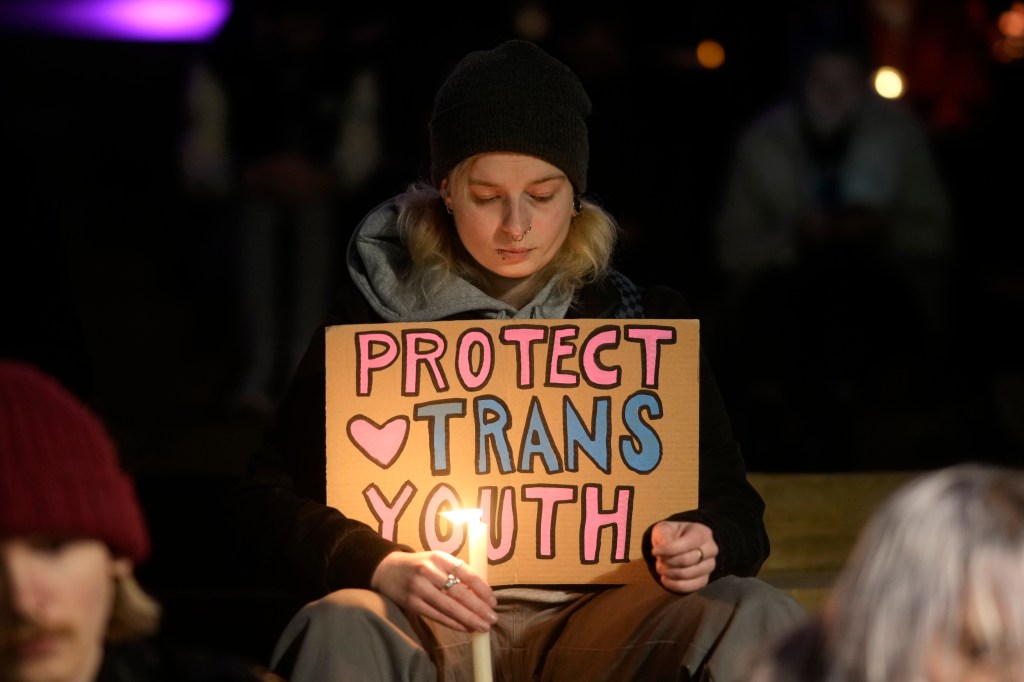
In February, the trans community was left in mourning after news broke that 16-year-old trans girl Brianna Ghey has been stabbed to death in a park in Warrington. Thousands of trans people and their allies attending vigils up and down the UK, as well as in the US and Australia.
The simple message on the placard in the photo, the holder’s solemn expression, and a candle lit in memory of a life lost, represents the heart-breaking reality of transphobia and the devastating impact it has on transgender youngsters and the wider community.
Turkey’s LGBTQ+ community celebrates Pride – despite government ban
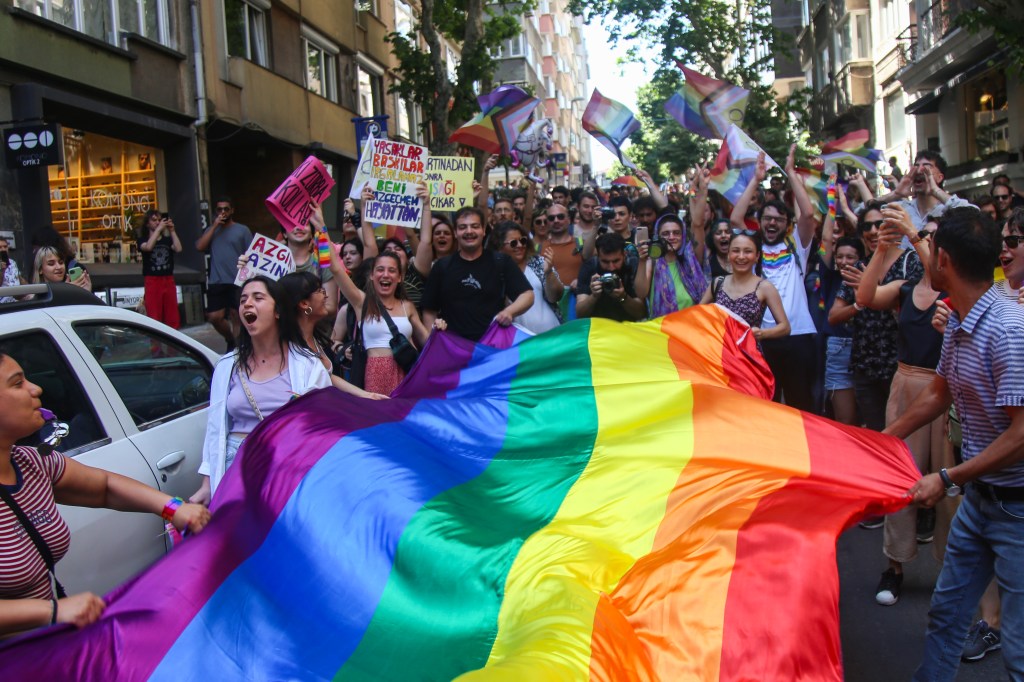
In June, hundreds of LGBTQ+ people and their allies in Turkey celebrated Pride by holding a march in the western coastal city of Izmir and staged the Istanbul Pride March – which had been banned for a ninth consecutive year.
The events took place in spite of a government crackdown on the community, which has intensified this year and seen president Recep Tayyip Erdoğan claim the community are the “biggest threats against the family” and say he “does not accept LGBT”.
More than 100 people were detained at the events after police shut down public transport and blocked access to a number of roads.
Speaking to Euronews at the time, Istanbul Pride committee member Can Kortun said: “They are aware of our strength and numbers. They are aware of the change we can accomplish. But despite that, they refuse to communicate, and they are so afraid of us that they don’t let us come out.”
Ugandan trans woman watches the
Anti-Homosexuality Bill pass
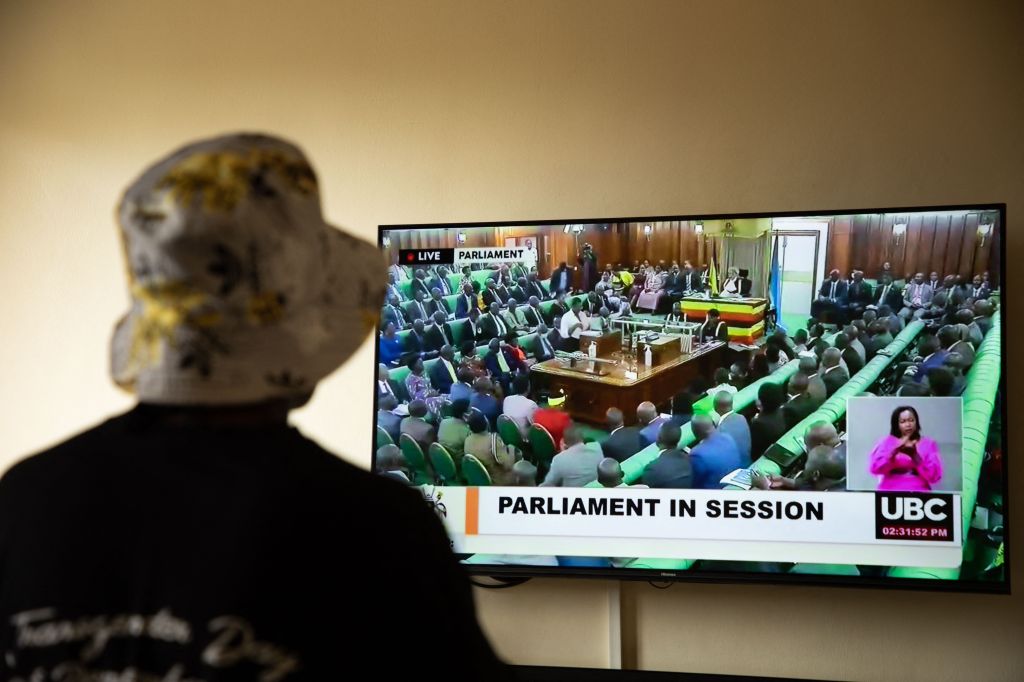
The passage of Uganda’s Anti-Homosexuality Bill this year saw the world’s harshest anti-gay legislation come into force, to the horror and outrage of world leaders, activists and human rights charities.
This image of an transgender woman witnessing the bill passing through parliament represents the tragic reality of LGBTQ+ Ugandans, who were unable to speak up against legislation that further criminalises their very existence. They now live in constant fear of social isolation, imprisonment and even death.
The bill upholds the East African nation’s prior criminalisation of gay sex and introduced the death penalty for what is described as “aggravated homosexuality”, which includes having consensual sex with someone with HIV, disabled persons or those over the age of 75, alongside other criminal offences such as same-sex rape and sex with minors.
The bill also makes it illegal to “promote” homosexuality or even rent a property to people believed to be gay. It even carries a prison sentence for anyone “failing to report” a suspected homosexual.
The United Nations said it was “deeply concerned” by the violence vulnerable people face, following the bill being signed by President Yoweri Museveni, while the World Bank cut off new lending to the country and the US said it intends to cut economic ties with Uganda.
There has been a spike in abuse towards LGBTQ+ people since the bill came into force, with many arrests and one man facing the death penalty for engaging in same-sex acts.
Same-sex parents in Italy fight for their families
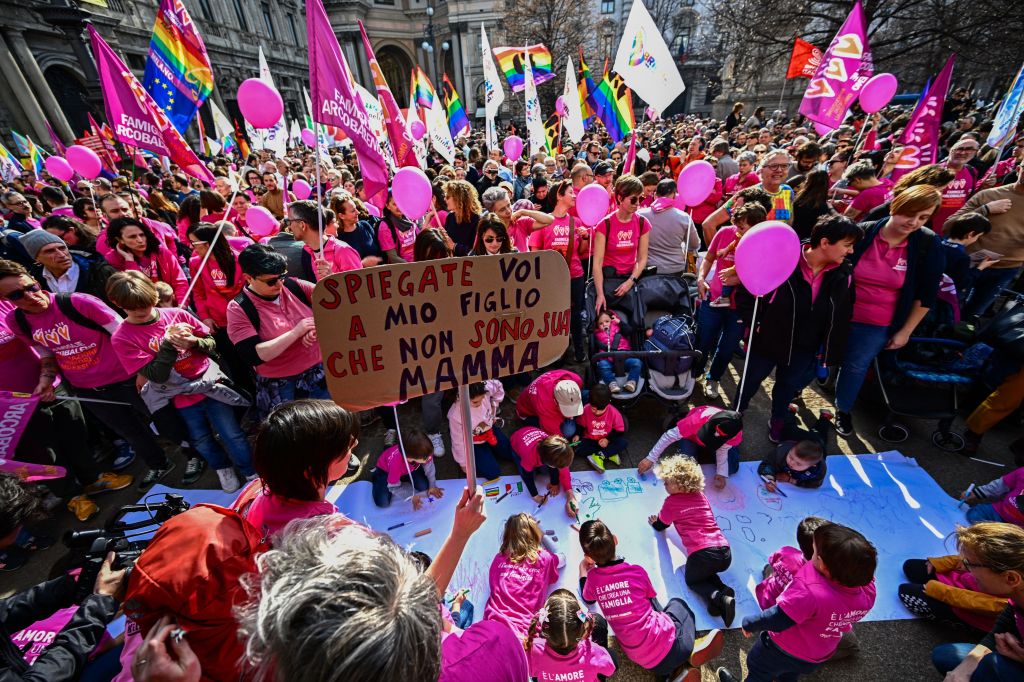
(GABRIEL BOUYS/AFP via Getty Images)
This year, Italy’s right-wing government under Giorgia Meloni sought to reduce the rights of same-sex parents by ordering the names of lesbian mothers who did not give birth to be removed from their children’s birth certificates.
“These children are being orphaned by decree,” left-wing politician and LGBTQ+ rights advocate Alessandro Zan said at the time. “This is a cruel, inhumane decision.”
Meloni is a controversial figure who has openly expressed hostility towards immigrants, the LGBTQ+ community and those seeking access to safe abortions.
The move to revoke the legal parental rights of non-biological lesbian mothers has already seen dozens of mums’ names removed from birth certificates. This image shows just one of the protests against the new law.
Zooey Zephyr banned from the Montana House of Representatives

Zooey Zephyr, the first openly transgender person to be elected to the state legislature in Montana, gained national attention in April when she was publically censured and later banned from the House floor after speaking out against an anti-trans healthcare bill.
Republicans voted to ban the Missoula representative for the remainder of the 2023 legislative session after she accused anti-trans lawmakers of having “blood on their hands” over Montana Senate Bill 99. The bill – also known as the Youth Health Protection Act – sought to prevent trans youth under-18 accessing gender-affirming care in the state.
Despite being banned from the House floor, Zephyr continued to work for her constituents in the hallway.
This image of her sitting on a bench has been viewed millions of time on social media and represented the deeply entrenched anti-trans bigotry currently rife in politics.
Germany’s Holocaust Memorial Day commemorates queer victims for first time
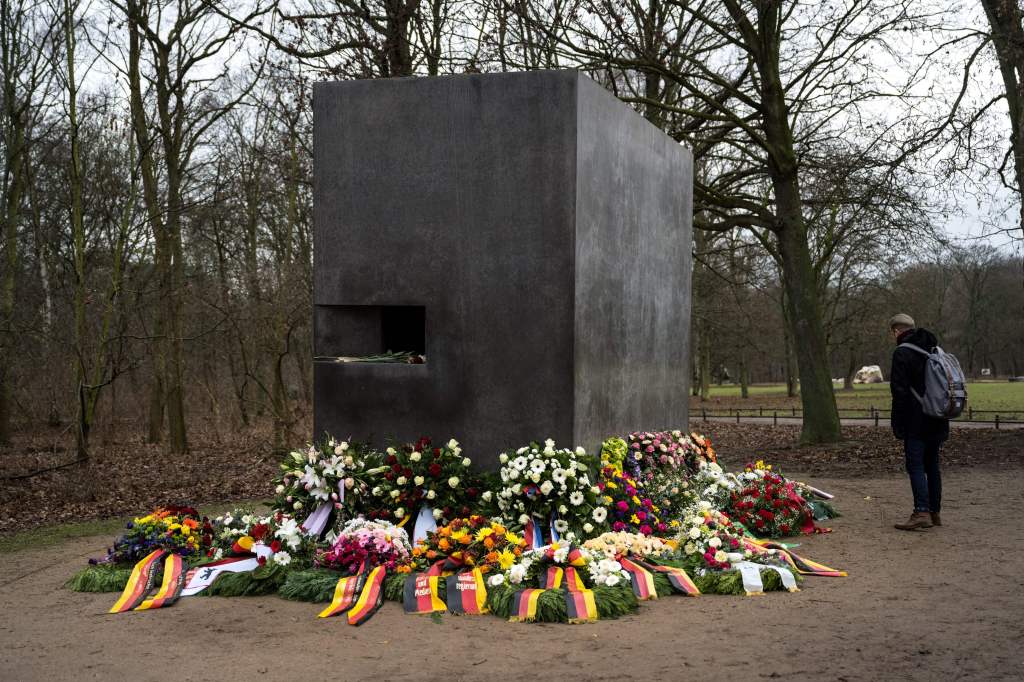
In January, for the first time, the German parliament focused its Holocaust Memorial Day commemorations on people persecuted and murdered for being LGBTQ+.
Germany has officially marked the day since 1996 and each year holds a ceremony at the Bundestag, the German federal parliament.
Bundestag president Bärbel Bas reminded people that Germany had long criminalised homosexuality but the Nazis emboldened the laws so that many more people could be convicted under flimsier evidence.
“Kisses, caresses, even looks were criminalised,” she said. “The harshest fates were suffered by the many thousands of women and men deported to concentration camps as a result of their sexuality. Sometimes on false pretexts.
“They found themselves on the very bottom rung of the so-called camp hierarchy and were exposed to constant violence with absolutely no protection. Many of them were exploited in medical experiments. Most of them died within a short period of time or were murdered.”
It is estimated there were up to 15,000 queer victims of the Holocaust and the powerful image of flowers laid in front of the Memorial to Homosexuals Persecuted Under Nazism, in Berlin, represents that in 2023, and beyond, they will not be forgotten.
